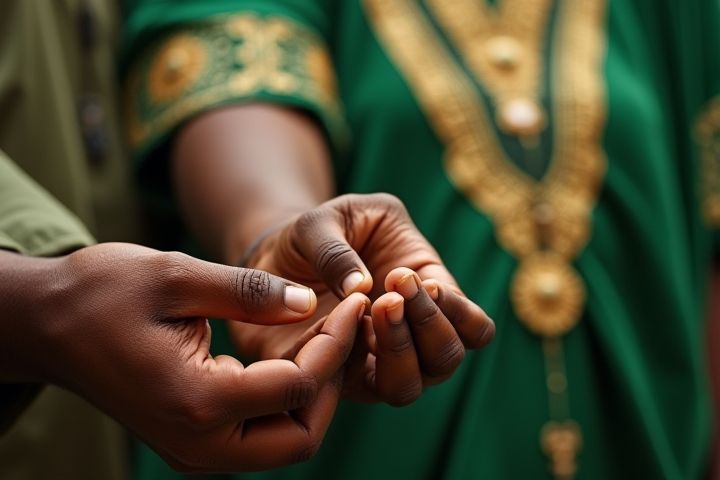
Nigeria is home to a diverse range of religions, with Islam and Christianity being the two major faiths. Approximately 50% of the population practices Islam, predominantly in the northern regions of the country, while about 48% identifies as Christians, mainly in the southern and central areas. The practice of indigenous religions also plays a significant role, especially among various ethnic groups. Religious identity often influences cultural practices, politics, and social interactions within Nigerian society. Understanding these religious dynamics is crucial for grasping the complexities of Nigeria's social fabric and the challenges it faces.
Christianity
Nigeria has a rich tapestry of religions, with Christianity being a dominant faith, especially in the southern and central regions. With approximately 50% of the population identifying as Christians, the religion encompasses various denominations, including Catholicism, Protestantism, and Pentecostalism. Major cities like Lagos, Abuja, and Port Harcourt feature numerous churches, often hosting vibrant worship services and community events. The religion plays a significant role in shaping cultural practices, societal values, and political dynamics within the nation.
Islam
Nigeria has a significant Islamic population, particularly in the northern regions, where the religion encompasses various cultural and historical dimensions. Sunni Islam, predominantly followed, emphasizes the teachings of the Quran and the Hadith while branches like Sufism contribute to the diverse spiritual landscape. Major Islamic practices include daily prayers, fasting during Ramadan, and annual pilgrimages to holy sites, fostering community bonds among Muslims. You can observe the rich tapestry of Islamic festivals, such as Eid al-Fitr and Eid al-Adha, which highlight Nigeria's vibrant culture and deep-rooted faith.
Indigenous religions
Nigeria's rich tapestry of Indigenous religions encompasses a variety of spiritual practices and beliefs that are deeply rooted in the country's diverse ethnic groups. These Indigenous religions often feature a pantheon of deities, ancestral worship, and an emphasis on the interconnectedness of humans, nature, and the spiritual world. Rituals, ceremonies, and customs serve to maintain harmony with the environment and honor ancestral spirits, reflecting community values and identity. You may find that the vibrancy of these traditions continues to influence cultural practices, despite the presence of major world religions in the nation.
Pentecostalism
Nigeria's major religions include Islam, Christianity, and indigenous beliefs, with a profound focus on Pentecostalism within Christianity. This dynamic branch emphasizes personal experience of God through the Holy Spirit, and it has dramatically shaped the religious landscape since its emergence in the mid-20th century. Pentecostal churches, characterized by vibrant worship, healing services, and an emphasis on prosperity theology, attract millions of followers across the nation. You will find that this movement has also influenced social and political spheres, fostering changes in community engagement and grassroots mobilization.
Sunni Islam
Nigeria has a significant Sunni Muslim population, primarily concentrated in the northern regions of the country. The majority of Nigerian Muslims adhere to the Maliki school of thought, which emphasizes adherence to traditional practices and the teachings of the Quran and Hadith. Religious practices among Sunni Muslims in Nigeria often include daily prayers, fasting during Ramadan, and participation in communal worship activities, which strengthen community bonds. As a culturally diverse nation, Nigeria's Sunni Islamic practices coexist alongside various ethnic traditions and other religious beliefs, creating a unique religious tapestry.
Catholicism
Nigeria is home to a rich tapestry of religious beliefs, with Catholicism being one of the prominent faiths practiced, particularly in the southeastern region. The Roman Catholic Church in Nigeria has a significant influence, boasting millions of adherents and a network of dioceses, schools, and hospitals that serve local communities. Major celebrations, such as Christmas and Easter, see massive participation, reflecting the deep-rooted cultural and spiritual connection among followers. In recent years, the Catholic Church has been actively involved in social justice issues, advocating for education, healthcare, and peacebuilding in various parts of the country.
Anglicanism
In Nigeria, Anglicanism is a significant branch of Christianity, deeply integrated into the cultural and social fabric of the nation. The Anglican Communion in Nigeria is one of the largest, with millions of adherents spread across various dioceses, primarily concentrated in the southern and central regions. Anglican churches play a vital role in community development, education, and healthcare, reflecting the denomination's commitment to social responsibility. You can explore various programs and initiatives led by the Church of Nigeria (Anglican Communion) that address contemporary issues like poverty, gender equality, and youth empowerment.
Sufism
Nigeria's major religions include Islam and Christianity, with a significant presence of Sufism within the Muslim community. Sufism emphasizes a personal, mystical connection to God, encouraging practices such as meditation, chanting, and love for the divine. Prominent Sufi orders in Nigeria, such as the Tijaniyya and Qadiriyya, have established numerous Islamic schools and centers that serve as hubs for spiritual education and community development. You may find that Sufi festivals, where music and dance are integral, foster unity and cultural expression among diverse Nigerian ethnic groups.
Evangelical churches
In Nigeria, Christianity, particularly Evangelicalism, plays a significant role in the country's religious landscape. Evangelical churches, such as the Redeemed Christian Church of God and Winners' Chapel, emphasize personal faith, conversion experiences, and biblical teachings. These churches often focus on community engagement, social justice, and grassroots mobilization, fostering a strong sense of belonging among their congregants. Your understanding of Nigeria's vibrant Evangelical movement reflects its impact on both spiritual and cultural development within the nation.
Traditional African beliefs
Nigeria's major religions include Islam and Christianity, but Traditional African beliefs continue to play a significant role in the spiritual lives of many Nigerians. These indigenous belief systems often emphasize the importance of ancestral worship, spiritual connections to nature, and community rituals that foster social cohesion. Your understanding of Nigeria's cultural heritage can be enriched by exploring the diverse practices associated with divination, healing rituals, and the reverence for deities representing natural elements. Traditional beliefs frequently coexist with and even influence other religious practices, creating a unique tapestry of spiritual life in Nigeria.
